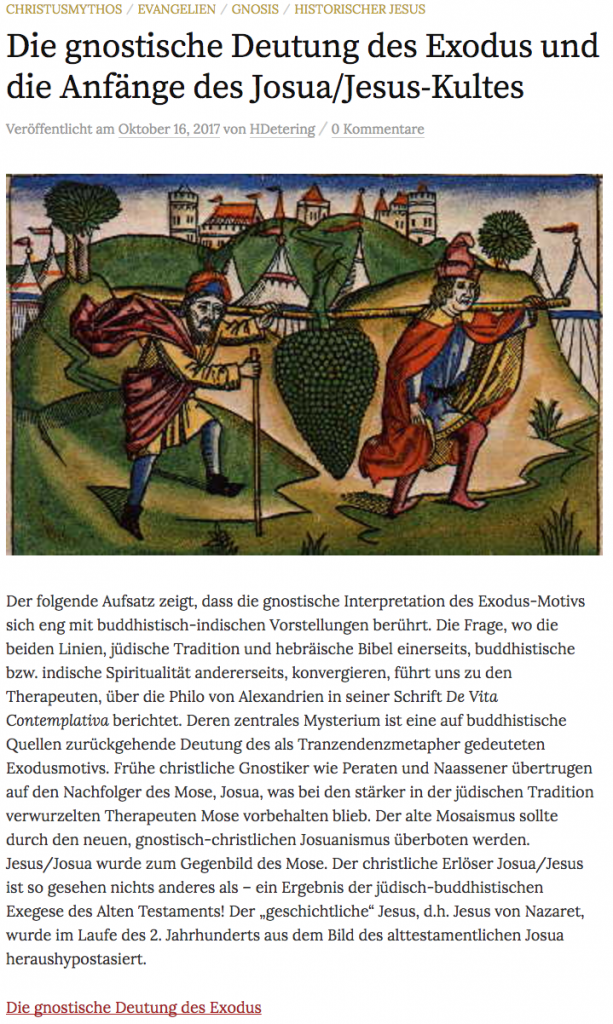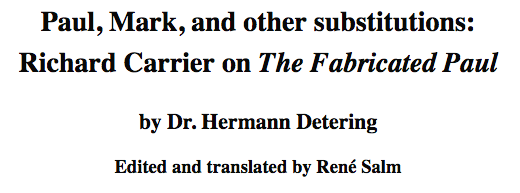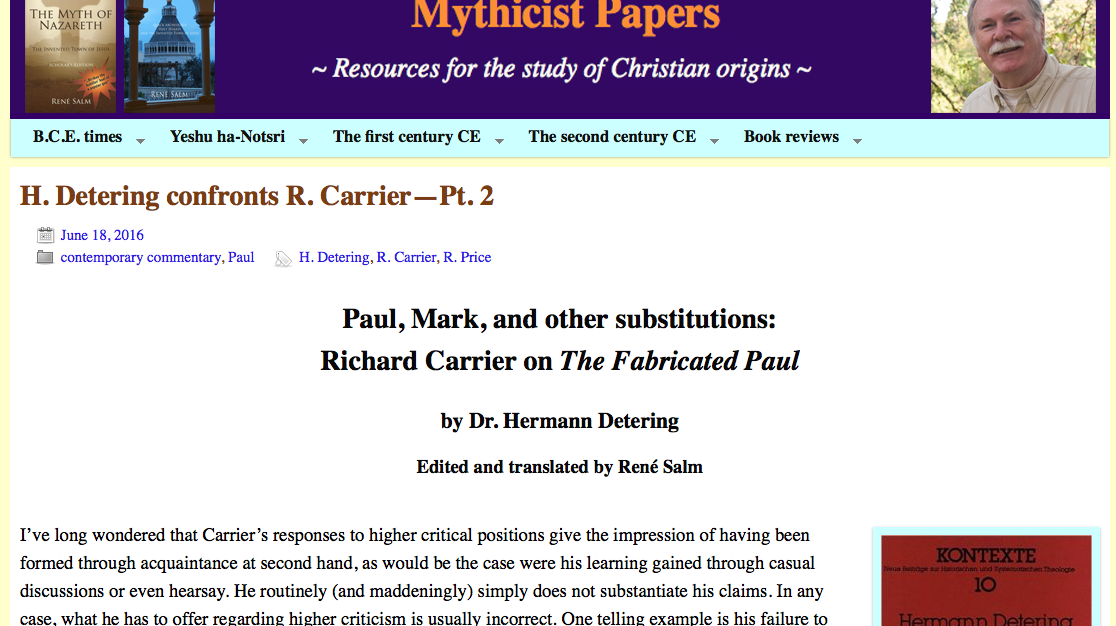I recently posted reasons to question the Pauline authorship of Galatians, which was a distillation of Detering’s challenges. Since some fundamentalists prefer J. P. Holding’s arguments against these challenges, am posting these little ripostes:
Holding 1:
Detering seems to be under the impression that where Paul offers his credentials (eg, “an apostle”) this somehow could indicate that someone else wrote the letter. He claims (with no documentation, other than quoting a single such greeting from a letter, “Cicero greets Atticus”) that the greetings employed by Greeks and Romans were “very unpretentious.” Not that, again, Detering provides examples, much less examples of letters from a person in authority to a person or persons under them. Oddly enough, we find here no comment from a classical scholar about Paul’s greeting in Philippians being more “pretentious” than that of the one Detering uses as an example. Much less does Detering quote any authority that regards Paul’s openings as unusual; it’s the usual case in higher criticism of inventing a problem out of whole cloth.
Either Holding is simply not familiar with ancient letters or assumes his audience would not be familiar with them or both. Anyone who is familiar with ancient letters knows that the example Detering provides is quite sufficient to jog their memories.
It appears Holding has no interest in checking the evidence for himself, but complains that Detering does not quote an authority to support his claim. No doubt an argument from authority comes easily to one who argues on the authority of God. I don’t know if this could be attributed to laziness or fear of what he might find if he checked all the other letters in a collection of Cicero or Pliny. Or any of the fictional letters that set themselves the task of convincing readers of their plausible authenticity and to this end contained the same unpretentious introductions.
Holding’s hyperlink at “here” points to a classical scholar who does not remark on the unusualness of Paul’s letters. I clicked on that link to be taken to a classicist’s email discussion relating indirectly to the matter. So I googled that classicist’s name and university, found his homepage in one shot, and lo and behold, there in its left hand margin is a nice bright golden crucifix link that takes one to that classicist’s homepage of zillions of bible-study tools. So much for Holding attempting to give the impression he was appealing to “the authority” of an umpire with no conflict of interest.
In fact, Paul’s assertions of his credentials make perfect sense in an honor-based culture, given Paul’s unusual situation as one whose authority was a question mark at times;
Okay, so Paul was the only one who wrote letters from an unusual situation in that culture? Paul’s situation was so unique that he was the only one to use the letter’s introduction to argue a controversial point?
There are other contextual reasons for the length in these cases: matters of identity and honor, and the insertion of Christological material, for example, which would not apply to something like “Cicero greets Atticus
Yes, the honor based culture thing again. Didn’t Paul pass on Christ’s teaching to come out of the world’s ways and follow humility? But of course it is surely obvious that Holding is arguing in a circle here. He is simply repeating the contents of the introductions as if that is sufficient to explain why the introductions contained such material in the first place.
Holding 2:
Detering also makes some rather silly remarks, such as commenting on Gal. 1:1, “to the churches in Galatia,” saying, “The poor letter-carrier!” Yes, I’m quite sure the experience was unbearable, but despite Detering’s ignorant sarcasm, people had ways of getting letters around: For example, you looked around for someone heading out the same way as the letter’s destination, or hired a messenger, or got a slave to carry it. Then again, if Detering thinks one person carrying a letter around Galatia may have been a hardship, I suppose he thinks that no one in antiquity ever got up from their seats. . . .
Holding appears not to have comprehended Detering’s argument. It was all about the vagueness of the addressees. Holding completely ignores this, the only point Detering was discussing.
Holding 3:
But of these who seemed to be somewhat, (whatsoever they were, it maketh no matter to me: God accepteth no man’s person) Detering blows his stack over the use of “were,” supposing it means the apostles in question were dead, so this means this was written well past Paul’s time. It’s funny how a forger this clever can miss such an obvious point, but it’s the usual case of overblow we get from the radical criticism school: Contextually, “were” just as well refers to former positions of status within a community (such as, “I used to be the top student under this rabbi”).
Oh dear, Holding must have been writing this late at night. He completely fails to see that he (Holding) is actually arguing that the author of the letter of Galatians believes that Peter, James and John were only apostles by a “former status” within the Jerusalem community. So what had changed by the time the letter was written for the author to say they “were” of this status?
It’s “funny how” Holding, in his own words, so “clever, can miss such an obvious point”.
Holding 4:
Gal. 6:11: See what large letters I use as I write to you with my own hand! Detering goes gaga over this, wondering why Paul wants to guard against falsification of letters in his own lifetime. As before, Detering seems to be the only person who thinks this would not happen; as if indeed forgers only worked with dead people, which is obviously true today. That said, more informed scholars like Witherington (Galatians commentary, 442) have an obvious reason for this authentication: Given the sensitive nature of the letter, Paul wishes to affirm that though (as was normal for the period) a scribe penned the bulk of it, he stands fully behind it; no one can say that someone else is trying to cover for Paul or speak on his behalf, which would be a sensitive issue of honor under the circumstances.
Curiously, Holding fails to provide “an authority” that ancient forgeries had different targets from those today. But I would rather he pointed to other ancient examples of letters forged in the names of contemporaries. Even more interesting had he explained how they got away with establishing such forgeries as the generally accepted authentic writings while the contemporaries were alive to expose them.
As for the specifics of the argument cited as Witherington’s (the obligatory authority), I agree that it would make perfect sense for Paul to write a bit of it with his own hand. No doubt all the churches in Galatia had access to a file which contained a copy of Paul’s handwriting, kept in secure vaults and verified by Justices of the Peace or local magistrates, and also to professional handwriting experts, to establish to the readers that the parchment or whatever really was from “the Paul”.
Of course, no scribe could ever make a second copy of the letter. Or if he did, he would have to omit those last words or at best add a gloss to them. (Why has such a gloss not come down to us in any manuscripts?) Let’s leave behind this “hermeneutic of suspicion” a moment and suggest that the letter was finally faithfully copied without qualms after the original readers had died out or the issue addressed was long since dead. (In which case what would have been the purpose of copying this very tattered parchment or papyrus at all . . . — and if according to Justin Martyr the issue was still alive in the mid second . . . . ??)
If my point is still unclear, this claim for evidence of authenticity can only “work” in a late forgery. An original author making such a claim would, if he had half his wits about him, have realized the vacuousness of such a claim. Or perhaps Holding can cite an authority that this was the most obvious and normal practice authors used to authenticate their letters.
Holding 5:
Detering cannot understand why Paul would go into Arabia and not Jerusalem. It’s not too hard to figure: Paul is perhaps following the path of the Exodus, and perhaps even visiting Mt. Sinai, as Wright has suggested. However, it is just as well to suppose that he chose this as a nearby mission field after Damascus; and has every reason to NOT return to Jerusalem to face his Pharisee superiors who are naturally not going to be pleased that he botched on his job of arresting Christians by becoming one.
It’s quite exciting fun to make up imaginary itineraries to explain away the implausible, as Holding and Wright do here. Besides, can’t you just imagine the Paul whose every breath was in opposition to the Mosaic law making a pilgrimage to Mount Sinai in preference to the empty tomb in Jerusalem! This the man who counted all his past life in the law as dead from the moment Christ revealed himself in him. Holding also likes to pretend Paul might have set up a missionary station in Arabia, despite the passage in Galatians clearly conveying the idea that Paul went hermit, like Jesus into the wilderness, rather than make contact with “flesh and blood” (Gal. 1:15-17). But I like the last ‘let’s pretend’ best: Paul being too timid to face his superiors after being so profoundly converted that he was quite prepared to take on the leading apostles who knew Jesus personally, the high priest, the king, stonings, shipwrecks, scourgings, Caesar himself. This the man who could strike blind any who mocked his message (Acts 13:11). Too fearful even to enter Jerusalem secretly, if only to pay quiet apologetic respects at the tomb of Stephen.
Holding disputes Detering’s argument of psychological implausibility by fantasizing even bigger psychological implausibilities.
Like this:
Like Loading...



